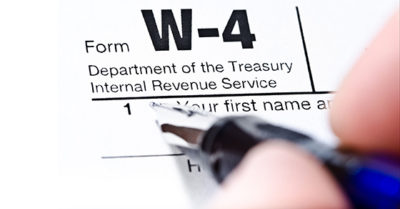Employees don’t always fill out their W-4 forms accurately. For example, some may wrongly write “exempt” on the withholding portion of the form to ensure that no federal or state tax is withheld. Others may be inadvertently underwithholding because of recent tax law changes. Although the employees themselves are liable for improperly completing their W-4s, […]
Categories
- Employer Knowledge Base (17)
- Individual Taxes (366)
- News (31)
- Small Business Taxes (333)
Archives
- January 2025 (7)
- December 2024 (9)
- November 2024 (8)
- October 2024 (9)
- September 2024 (9)
- August 2024 (8)
- July 2024 (11)
- June 2024 (7)
- May 2024 (9)
- April 2024 (9)
- March 2024 (8)
- February 2024 (8)
- January 2024 (11)
- December 2023 (7)
- November 2023 (9)
- October 2023 (9)
- September 2023 (8)
- August 2023 (9)
- July 2023 (7)
- June 2023 (8)
- May 2023 (10)
- April 2023 (8)
- March 2023 (9)
- February 2023 (8)
- January 2023 (9)
- December 2022 (8)
- November 2022 (10)
- October 2022 (8)
- September 2022 (8)
- August 2022 (8)
- July 2022 (8)
- June 2022 (6)
- May 2022 (9)
- April 2022 (7)
- March 2022 (9)
- February 2022 (7)
- January 2022 (9)
- December 2021 (8)
- November 2021 (9)
- October 2021 (7)
- September 2021 (7)
- August 2021 (9)
- July 2021 (8)
- June 2021 (10)
- May 2021 (9)
- April 2021 (8)
- March 2021 (12)
- February 2021 (8)
- January 2021 (8)
- December 2020 (10)
- November 2020 (9)
- October 2020 (8)
- September 2020 (9)
- August 2020 (8)
- July 2020 (8)
- June 2020 (9)
- May 2020 (9)
- April 2020 (11)
- March 2020 (15)
- February 2020 (10)
- January 2020 (10)
- December 2019 (11)
- November 2019 (7)
- October 2019 (9)
- September 2019 (9)
- August 2019 (7)
- July 2019 (10)
- June 2019 (3)
- May 2019 (7)
- April 2019 (10)
- March 2019 (6)
- February 2019 (8)
- January 2019 (7)
- December 2018 (6)
- November 2018 (6)
- October 2018 (12)
- September 2018 (4)
- August 2018 (7)
- July 2018 (10)
- June 2018 (4)
- May 2018 (12)
- April 2018 (6)
- March 2018 (10)
- February 2018 (10)
- January 2018 (9)
- December 2017 (3)
- July 2016 (2)
- June 2016 (1)
- May 2016 (1)
- April 2016 (1)
- February 2016 (1)
- January 2016 (1)
- December 2015 (3)
- October 2015 (1)
- July 2015 (7)
- June 2015 (1)
In many parts of the country, summer is peak season for selling a home. If you’re planning to put your home on the market soon, you’re probably thinking about things like how quickly it will sell and how much you’ll get for it. But don’t neglect to consider the tax consequences. Home sale gain exclusion […]
At this time of year, a summer vacation is on many people’s minds. If you travel for business, combining a business trip with a vacation to offset some of the cost with a tax deduction can sound appealing. But tread carefully, or you might not be eligible for the deduction you’re expecting. General rules Business […]
If you received a large refund after filing your 2017 income tax return, you’re probably enjoying the influx of cash. But a large refund isn’t all positive. It also means you were essentially giving the government an interest-free loan. That’s why a large refund for the previous tax year would usually indicate that you should […]

IRS examiners use Audit Techniques Guides (ATGs) to prepare for audits — and so can small business owners. Many ATGs target specific industries, such as construction. Others address issues that frequently arise in audits, such as executive compensation and fringe benefits. These publications can provide valuable insights into issues that might surface if your business […]
The summer months are almost here and, with them, the prospect of many employers offering unpaid internships to high school and college students. If your organization is considering such a move, tread carefully. Under the Fair Labor Standards Act (FLSA), if an intern is determined to actually be an employee, the employer must pay him […]
Sign up for our Newsletter!
"*" indicates required fields
News & Articles
Client Portal
Contact Us
© Wamhoff Accounting Services | All Rights Reserved | Privacy Policy | Terms of Use | 636-573-1250 | Email Us






